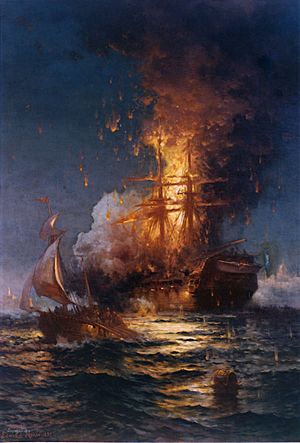Second Battle of Tripoli Harbor facts for kids
Quick facts for kids Second Battle of Tripoli Harbor |
|||||||
|---|---|---|---|---|---|---|---|
| Part of the First Barbary War | |||||||
 Burning of the frigate Philadelphia in the harbor of Tripoli, 16 February 1804, Edward Moran |
|||||||
|
|||||||
| Belligerents | |||||||
| Commanders and leaders | |||||||
| Strength | |||||||
| 1 brig 2 schooners 2 galleys 19 gunboats |
1 frigate 3 brigs 3 schooners 2 bomb vessels 10 gunboats 1 bomb ketch |
||||||
| Casualties and losses | |||||||
| Unknown | 54 killed and wounded 1 frigate scuttled 1 bomb ketch sunk |
||||||
The Second Battle of Tripoli Harbor was an important fight at sea during the First Barbary War. It happened on July 14, 1804, in Tripoli's harbor. This battle was part of a bigger conflict between the United States and the area known as Tripolitania.
Contents
Background to the Battle
Setting the Scene: The Blockade
In 1803, Commodore Edward Preble took charge of the U.S. Navy ships in the Mediterranean Sea. He started a blockade of Tripoli harbor. A blockade means using ships to stop other ships from going in or out of a port.
The Capture of USS Philadelphia
The first big event of this blockade happened on October 31, 1803. The American ship USS Philadelphia got stuck on a hidden coral reef. The Tripolitan Navy quickly captured the ship, along with its crew and Captain William Bainbridge. The Philadelphia was then used by the Tripolitans as a gun battery in their harbor.
A Daring Rescue Mission
On the night of February 16, 1804, a small group of U.S. Marines carried out a very brave plan. They used a captured Tripolitan boat called a ketch, which they renamed USS Intrepid. Led by Lieutenant Stephen Decatur, Jr., they tricked the guards on the captured Philadelphia.
They got close enough to board the ship. Decatur's men quickly took over the vessel and defeated the Tripolitan sailors guarding it. To make sure the enemy could not use the Philadelphia again, Decatur's team set it on fire. This daring act made Decatur one of America's first military heroes after the Revolutionary War. Even famous British Admiral Horatio Nelson reportedly called it "the most bold and daring act of the age."
The Battle of Tripoli Harbor
Commodore Preble attacked Tripoli directly on July 14, 1804. There were several battles, but none of them ended with a clear winner. One very brave but sad attack involved the fire ship USS Intrepid. This ship was packed with explosives.
The plan was for Intrepid, led by Master Commandant Richard Somers, to sail into Tripoli harbor and explode, destroying enemy ships. However, the Intrepid was destroyed before it reached its target, possibly by enemy guns. Somers and his crew were all killed in the explosion.
Aftermath of the Conflict
The attacks on Tripoli harbor continued without a clear victory for some time. Then, in September, Commodore Samuel Barron took command of the Mediterranean Squadron. He decided to focus the fleet's efforts on supporting William Eaton's land attack on Derne. This attack, known as the Battle of Derne, ended in a victory for the Americans.
Notable Heroes of the Blockade
Many of the United States' early naval heroes served during this blockade. These included Stephen Decatur, William Bainbridge, Charles Stewart, Isaac Hull, David Porter, Reuben James, and Edward Preble. They were often called Preble's Boys. Many of these officers would later play very important roles in the War of 1812.
Sources
- The Barbary Wars, 1801-1805
- Tripolitan War
- Burning of the Frigate Philadelphia, 16 February 1804
- Six Frigates: The Epic History of the Founding of the U.S. Navy by Ian W. Toll, 2005
- If By Sea by George C. Daugham, 2008
 | James Van Der Zee |
 | Alma Thomas |
 | Ellis Wilson |
 | Margaret Taylor-Burroughs |

